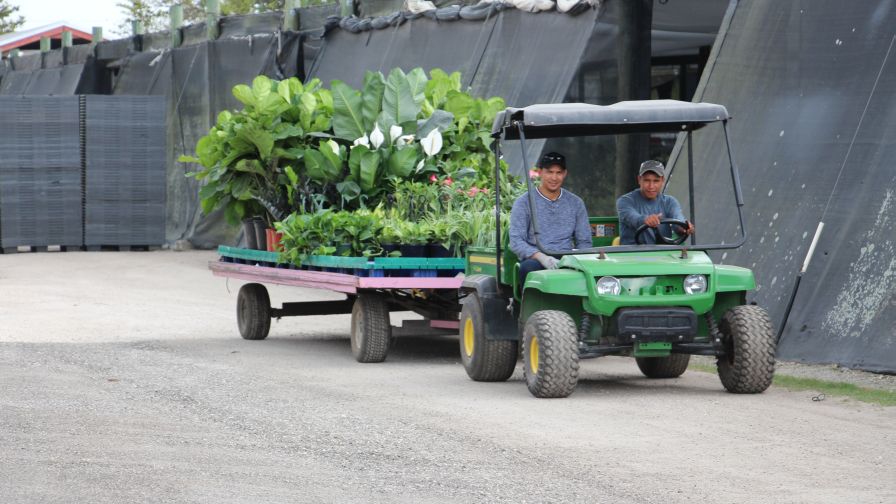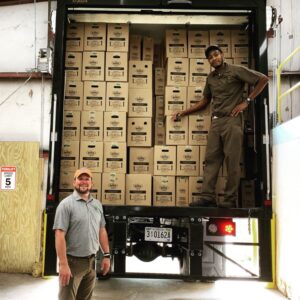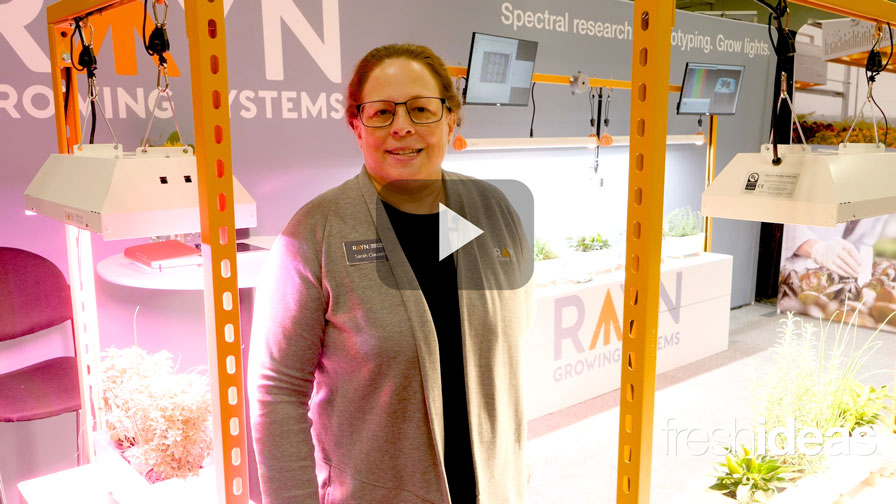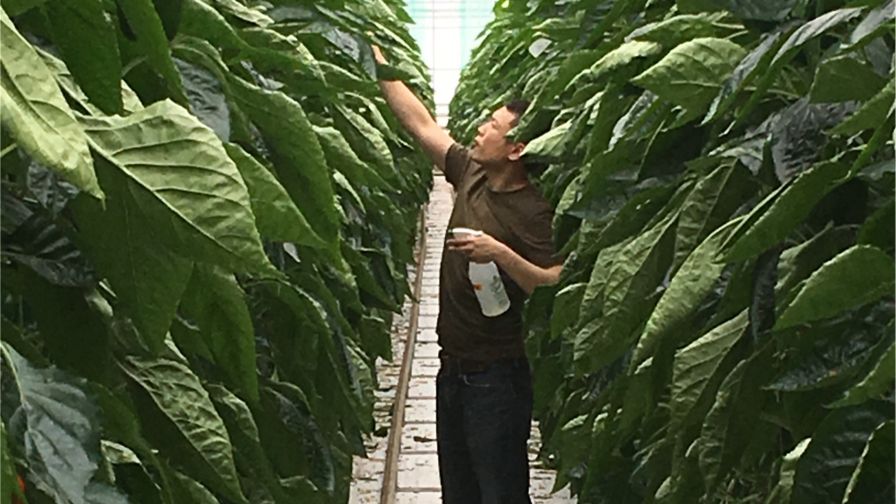Why Workers Are Key Components to Successful E-commerce Operations

Costa Farms opened a 90,000-square-foot facility dedicated to e-commerce fulfillment in Miami, FL, earlier this year. Photo: Janeen Wright
Editor’s note: This is the second installment of a three-part series on e-commerce. An article in the June issue of Greenhouse Grower covered shipping solutions. The article in the August issue will cover the value proposition growers offer in online sales.
An efficient workforce is a cornerstone of a thriving e-commerce operation. As this budding industry continues to grow, more companies are cross-training employees to work in greenhouses and package plants for shipping or hiring dedicated e-commerce personnel. The duties for an e-commerce employee are significantly different from a grower, but equally important for customer satisfaction.
When shipping plants, there must be a sense of trust between the business and the consumers, according to Sid Phelps, Director of E-commerce and Fulfillment for Bonnie Plants. Customers must trust that the employees will ship them a high-quality plant.
“In the e-commerce world, especially direct to consumer, you are the hands and the eyes of the consumer. You have to pay attention to detail and quality,” Phelps says. “If you were going to the grocery store to get an avocado, you’re going to dig through and find the perfect one for you at home. Our teams must be able to do that for this customer whenever we’re packaging their order.”
Phelps says Bonnie Plants has 50 to 200 employees working in e-commerce, depending on the time of year. Bonnie Plants has dedicated e-commerce employees at all its sites, who pull and package plants. There is a different level of training for e-commerce employees, he says, because they are trained to select a high-quality plant for every order.
“Step No. 1 is to make sure we give the best product we have in the greenhouse to the consumer,” Phelps says.

Bonnie Plants’ Director of E-commerce and Fulfillment Sid Phelps poses with a UPS delivery driver and a truck packed full of plants. Photo: Bonnie Plants
Bonnie Plants has four facilities nationwide working on e-commerce operations. Earlier this spring, the business added a 45,000-square-foot distribution warehouse for e-commerce operations in Union Springs, AL, the birthplace of Bonnie Plants.
When Bonnie Plants started its e-commerce operations in 2012, Phelps was the sole employee in that division. He worked alone in a 400-square-foot room to review damaged packages that were returned to the facility. This warehouse eventually turned into a 1,500-square-foot facility, then a new operation on the West Coast and another in the Northeast.
“My goal is to create an Amazon-like fulfillment center for live goods. Associates can work in that kind of platform because it is so customized,” Phelps says. “We’ve made some really big investments in the last year and a half, and we’re trying to expand our operations every year.”
Growers Expand E-commerce Operations
Costa Farms opened a new e-commerce facility in Miami, FL earlier this year. This 90,000-square-foot building is dedicated to packaging and fulfillment, says Bert Hucks, Vice President and General Manager of Costa Farms’ E-commerce Division.
At this facility, employees wash and wrap the pots by hand and prune the plants. The pots are placed on a conveyor belt, which carries them directly into the trailers for transportation.
Hucks credits an outstanding team at Costa for its success in e-commerce. Team members constantly ponder opportunities for improvement. The e-commerce division has a team of analysts who regularly check on customer satisfaction and look for areas of improvement. Hucks says that the skills necessary are different for online sales than selling to a brick and mortar.
“When you’re selling online, even through an online retailer, a lot of what the brick-and-mortar retailer would be doing to move that product, that responsibility has shifted to you,” Hucks says. “You’re responsible for setting up listings. You’re responsible for keeping track of consumer issues. You’re responsible for picking the assortment in most cases. You’re responsible for a lot of things that the retailer would normally do. You must keep that in mind while thinking through your business. It means you need to start thinking like a consumer, not like a grower.”
Smaller growers are expanding their e-commerce operations, as well. The Perennial Farm, which has 500,000 square feet of controlled-environment production in Glen Arm, MD, has 12 to 15 employees working in e-commerce during the busy season. Director of Marketing and E-commerce Tom Watson says the company’s e-commerce workforce outgrew its space, so it bought a new property.
E-commerce workers started off in a small space that was part of a larger production building, so they set up folding tables for packaging and took them down when it came time for shipping. When The Perennial Farm started selling plants on Amazon, it quickly outgrew that space.
“In late 2020, we needed to buy an extra piece of property. It was getting too condensed. The traffic was getting too high with everything going on with wholesale and retail,” Watson says. “We bought an adjacent piece of property that’s about 2 acres, and it has a big warehouse that we renovated. It’s about 7,000 square feet.”
Little Prince of Oregon Nursery, which has 272,000 square feet of controlled-environment production in Aurora, OR, has several employees trained for e-commerce operations. Little Prince launched its online store in April 2019. Director of Business Development Mark Leichty says launching an online store can be a “slow start” because it takes Google and other search engines a long time to recognize the site as a reputable source and list it in the search results.
“The customer service is more labor intensive for direct-to-consumer,” he says. “It’s not just shipping a plant to a customer. We are a resource and guide for plant care.”
Unique Skills for E-commerce
Groovy Plants Ranch (GPR) Co-owner Liz Hughes built her business’ website using the Shopify platform in 2015. In the fall of 2020, she hired Kelly Lorenz as the e-commerce leader. Lorenz manages the website to show the new offerings and current inventory at GPR. Hughes says that the amount of time put into the website has a direct correlation with their online sales. A more robust website leads to higher rankings in the search engines, she says.
Lorenz uses the website to tell the story of GPR. In addition to showing the plants that are for sale, the website offers educational tips and lists local shops and restaurants to support when visiting GPR near Columbus, OH.
The location for e-commerce operations has changed almost every year because it keeps growing, Hughes says. GPR plans to build a new structure dedicated to online sales fulfillment. She expects it to be at least the size of a four-car garage.
There are also two packers at the nursery, which has 20,000 square feet of environmentally-controlled production. Hughes says running a nursery requires different skills than maintaining a website and working on the shipping team. Those working in the greenhouse are wet when it’s wet, cold when it’s cold, and hot when it’s hot. The e-commerce team, on the other hand, works in a more controlled environment.
“The e-commerce team’s job is a lot more monotonous. They must wrap plants with cardboard and tissue paper, pack them, and be precise every time,” Hughes says. “They’re the kind of jobs some people would find really mind numbing and some people find really satisfying because you’re doing the same thing over and over again.”
Software to Assist the Workforce
ePlantSource is a solution for growers who have not set up their own e-commerce platform, says the company’s acting CEO Scott Hanks. This company is a brokerage of live goods for flowers and vegetables, including rooted cuttings, unrooted cuttings, and tissue culture. It also offers a software that manages orders and publishes availability. This allows brokers to order from a supplier without having to call or fax them. To use ePlantSource’s whitelabeled software, a business pays a monthly fee and the software presents product availability in a real-time fashion.









